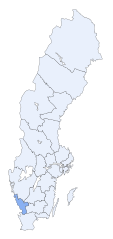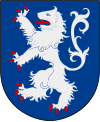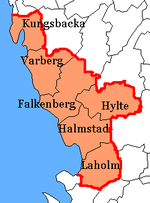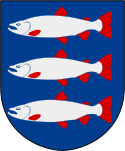Halland
| region administracyjny | |||||
 | |||||
| |||||
| Państwo | |||||
|---|---|---|---|---|---|
| Siedziba | |||||
| Data powstania | 1719 | ||||
| Kod ISO 3166-2 | SE-N (SE-13) | ||||
| Powierzchnia | 5454 km² | ||||
| Populacja (2016) • liczba ludności |
| ||||
| • gęstość | 58,4 os./km² | ||||
Adres urzędu: Slottsgatan 2301 86 HALMSTAD | |||||
Położenie na mapie Szwecji | |||||
| 56°43′N 12°49′E/56,716667 12,816667 | |||||
| Strona internetowa | |||||
| Portal | |||||
Halland (szw. Hallands län) – jeden ze szwedzkich regionów administracyjnych (län). Siedzibą władz regionu (residensstad) jest Halmstad.
Geografia
Region administracyjny Halland jest położony na zachodnim wybrzeżu Szwecji (Västkusten), w południowo-zachodniej części Götaland nad cieśniną Kattegat. Region obejmuje niemal całą prowincję historyczną (landskap) Halland oraz niewielkie fragmenty Västergötlandu i Smalandii.
Graniczy z regionami administracyjnymi Västra Götaland, Jönköping, Kronoberg oraz Skania.
Demografia
30 września 2016 roku Halland liczył 318 713 mieszkańców[1] (7. pod względem zaludnienia z 21 regionów administracyjnych Szwecji), gęstość zaludnienia wynosiła 58,4 mieszkańców na km².
Liczba mieszkańców regionu administracyjnego Halland w latach 1750–2015[2].
Historia
W 1645 roku na mocy traktatu w Brömsebro Dania została zmuszona do oddania Szwecji prowincji Halland na okres 30 lat jako zastawu pod odszkodowania wojenne. W 1658 roku (traktat w Roskilde) Halland przeszedł definitywnie we władanie Szwecji.
Początkowo Halland był zarządzany przez szwedzkiego gubernatora. Pierwszym generałem-gubernatorem, którego kompetencje obejmowały także sprawy Hallandu, został Lennart Torstensson. W 1658 roku Bengt Christoffersson Lilliehöök objął funkcję landshövdinga Hallandu.
W 1683 roku w Halland wprowadzono prawo szwedzkie, a w 1719 roku prowincja otrzymała własny zarząd (länstyrelsen) z siedzibą w Halmstad[3].
Gminy i miejscowości
Gminy
Region administracyjny Halland jest podzielony na 6 gmin:
|
Uwagi: W nawiasie liczba mieszkańców; stan na 30 września 2016 roku[1].
Miejscowości
10 największych miejscowości (tätort) regionu administracyjnego Halland (2010)[4]:
| # | Miejscowość | Gmina | Liczba mieszkańców (2010) |
|---|---|---|---|
| 1 | Halmstad | Halmstad | 58 577 |
| 2 | Varberg | Varberg | 27 602 |
| 3 | Falkenberg | Falkenberg | 20 035 |
| 4 | Kungsbacka | Kungsbacka | 19 057 |
| 5 | Onsala | Kungsbacka | 11 951 |
| 6 | Billdal | Kungsbacka/Göteborg | 6 482[a] |
| 7 | Laholm | Laholm | 6 150 |
| 8 | Oskarström | Halmstad | 4 071 |
| 9 | Hyltebruk | Hylte | 3 716 |
| 10 | Åsa | Kungsbacka | 3 369 |
Uwagi
- ↑ Tätort Billdal, liczący 10 289 mieszkańców, położony jest (według definicji SCB) w granicach dwóch regionów administracyjnych i gmin; północna część tätortu (3807 mk.) leży w gminie Göteborg (Västra Götaland).
Przypisy
- ↑ a b Statistiska centralbyrån: Folkmängd i riket, län och kommuner 30 september 2016 och befolkningsförändringar 1 juli – 30 september. [dostęp 2017-01-28]. (szw.).
- ↑ Statistiska centralbyrån: Folkmängd i län 1749–2015. [dostęp 2016-08-11]. (szw.).
- ↑ Länsstyrelsen i Hallands län: Lite om Hallands historia. [dostęp 2015-07-19]. (szw.).
- ↑ Statistiska centralbyrån: Befolkning och arealer. [dostęp 2016-08-11]. (szw.).
Linki zewnętrzne
Media użyte na tej stronie
(c) Lokal_Profil, CC BY-SA 2.5
This coat of arms was drawn based on its blazon which – being a written description – is free from copyright. Any illustration conforming with the blazon of the arms is considered to be heraldically correct. Thus several different artistic interpretations of the same coat of arms can exist. The design officially used by the armiger is likely protected by copyright, in which case it cannot be used here.
Individual representations of a coat of arms, drawn from a blazon, may have a copyright belonging to the artist, but are not necessarily derivative works.
Autor: Marmelad
, Licencja: CC BY-SA 2.5
This coat of arms was drawn based on its blazon which – being a written description – is free from copyright. Any illustration conforming with the blazon of the arms is considered to be heraldically correct. Thus several different artistic interpretations of the same coat of arms can exist. The design officially used by the armiger is likely protected by copyright, in which case it cannot be used here.
Individual representations of a coat of arms, drawn from a blazon, may have a copyright belonging to the artist, but are not necessarily derivative works.
Autor: Autor nie został podany w rozpoznawalny automatycznie sposób. Założono, że to Fred J (w oparciu o szablon praw autorskich)., Licencja: CC BY-SA 2.5
Autor: Lokal_Profil, Licencja: CC BY-SA 2.5
Map Swedish Counties, Halland.
(c) Lokal_Profil, CC BY-SA 2.5
This coat of arms was drawn based on its blazon which – being a written description – is free from copyright. Any illustration conforming with the blazon of the arms is considered to be heraldically correct. Thus several different artistic interpretations of the same coat of arms can exist. The design officially used by the armiger is likely protected by copyright, in which case it cannot be used here.
Individual representations of a coat of arms, drawn from a blazon, may have a copyright belonging to the artist, but are not necessarily derivative works.
(c) Lokal_Profil, CC BY-SA 2.5
This coat of arms was drawn based on its blazon which – being a written description – is free from copyright. Any illustration conforming with the blazon of the arms is considered to be heraldically correct. Thus several different artistic interpretations of the same coat of arms can exist. The design officially used by the armiger is likely protected by copyright, in which case it cannot be used here.
Individual representations of a coat of arms, drawn from a blazon, may have a copyright belonging to the artist, but are not necessarily derivative works.
Autor: Marmelad
, Licencja: CC BY-SA 2.5
This coat of arms was drawn based on its blazon which – being a written description – is free from copyright. Any illustration conforming with the blazon of the arms is considered to be heraldically correct. Thus several different artistic interpretations of the same coat of arms can exist. The design officially used by the armiger is likely protected by copyright, in which case it cannot be used here.
Individual representations of a coat of arms, drawn from a blazon, may have a copyright belonging to the artist, but are not necessarily derivative works.
(c) Lokal_Profil, CC BY-SA 2.5
This coat of arms was drawn based on its blazon which – being a written description – is free from copyright. Any illustration conforming with the blazon of the arms is considered to be heraldically correct. Thus several different artistic interpretations of the same coat of arms can exist. The design officially used by the armiger is likely protected by copyright, in which case it cannot be used here.
Individual representations of a coat of arms, drawn from a blazon, may have a copyright belonging to the artist, but are not necessarily derivative works.
(c) Lokal_Profil, CC BY-SA 2.5
This coat of arms was drawn based on its blazon which – being a written description – is free from copyright. Any illustration conforming with the blazon of the arms is considered to be heraldically correct. Thus several different artistic interpretations of the same coat of arms can exist. The design officially used by the armiger is likely protected by copyright, in which case it cannot be used here.
Individual representations of a coat of arms, drawn from a blazon, may have a copyright belonging to the artist, but are not necessarily derivative works.
Autor: Bjoertvedt, Licencja: CC BY-SA 3.0
Image from downtown Halmstad, western Sweden. This is the headquarter of Halland County (Länsstyrelsen för Hallands Län)
(c) Lokal_Profil, CC BY-SA 2.5
This coat of arms was drawn based on its blazon which – being a written description – is free from copyright. Any illustration conforming with the blazon of the arms is considered to be heraldically correct. Thus several different artistic interpretations of the same coat of arms can exist. The design officially used by the armiger is likely protected by copyright, in which case it cannot be used here.
Individual representations of a coat of arms, drawn from a blazon, may have a copyright belonging to the artist, but are not necessarily derivative works.

















